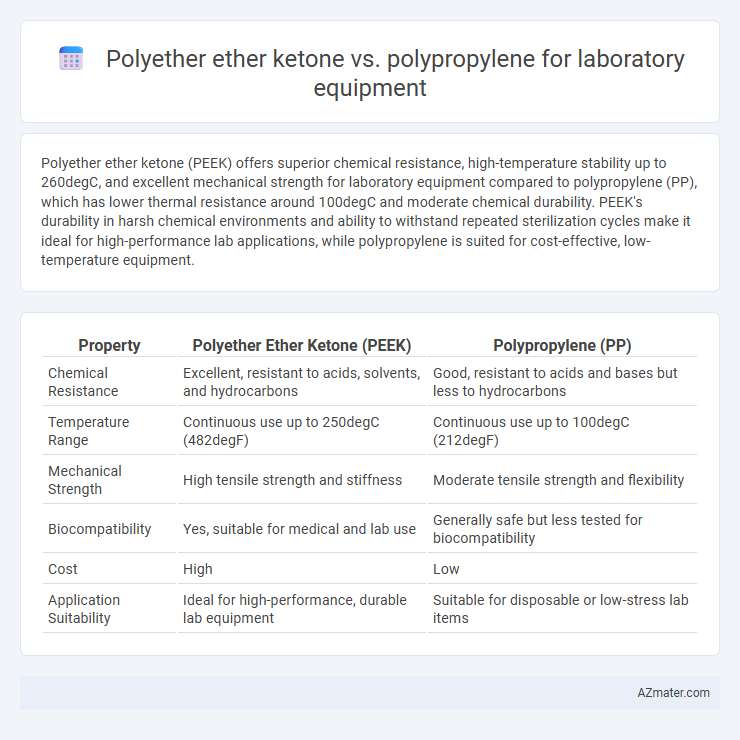Polyether ether ketone (PEEK) offers superior chemical resistance, high-temperature stability up to 260degC, and excellent mechanical strength for laboratory equipment compared to polypropylene (PP), which has lower thermal resistance around 100degC and moderate chemical durability. PEEK's durability in harsh chemical environments and ability to withstand repeated sterilization cycles make it ideal for high-performance lab applications, while polypropylene is suited for cost-effective, low-temperature equipment.
Table of Comparison
| Property | Polyether Ether Ketone (PEEK) | Polypropylene (PP) |
|---|---|---|
| Chemical Resistance | Excellent, resistant to acids, solvents, and hydrocarbons | Good, resistant to acids and bases but less to hydrocarbons |
| Temperature Range | Continuous use up to 250degC (482degF) | Continuous use up to 100degC (212degF) |
| Mechanical Strength | High tensile strength and stiffness | Moderate tensile strength and flexibility |
| Biocompatibility | Yes, suitable for medical and lab use | Generally safe but less tested for biocompatibility |
| Cost | High | Low |
| Application Suitability | Ideal for high-performance, durable lab equipment | Suitable for disposable or low-stress lab items |
Introduction to PEEK and Polypropylene in Laboratory Equipment
Polyether ether ketone (PEEK) is a high-performance thermoplastic known for its exceptional chemical resistance, high mechanical strength, and stability at elevated temperatures, making it ideal for demanding laboratory equipment applications. Polypropylene, a widely used polymer in laboratory settings, offers excellent chemical resistance and low cost but has lower thermal resistance and mechanical strength compared to PEEK. The choice between PEEK and polypropylene in laboratory equipment depends on specific requirements such as temperature tolerance, chemical exposure, and durability.
Chemical Resistance: PEEK vs Polypropylene
Polyether ether ketone (PEEK) demonstrates superior chemical resistance compared to polypropylene, maintaining structural integrity against aggressive solvents such as acids, alkalis, and hydrocarbons commonly used in laboratory settings. Polypropylene offers good resistance to many chemicals but can degrade or swell when exposed to strong oxidizing agents or certain organic solvents, limiting its use for more demanding chemical environments. PEEK's high thermal stability combined with its chemical inertness makes it ideal for laboratory equipment requiring long-term durability and exposure to harsh chemicals.
Mechanical Strength Comparison
Polyether ether ketone (PEEK) exhibits superior mechanical strength compared to polypropylene, with a tensile strength typically around 90-100 MPa versus polypropylene's 30-40 MPa. PEEK offers excellent rigidity and impact resistance, making it ideal for high-stress laboratory equipment that requires durability under mechanical load. Polypropylene's lower mechanical strength restricts its use to less demanding applications where flexibility and chemical resistance are prioritized over structural integrity.
Thermal Stability and Temperature Tolerance
Polyether ether ketone (PEEK) offers superior thermal stability with a continuous use temperature up to 250degC, significantly outperforming polypropylene, which typically tolerates temperatures only up to 100degC. PEEK maintains mechanical properties and chemical resistance at high temperatures, making it ideal for laboratory equipment exposed to rigorous thermal cycles. Polypropylene's lower melting point and susceptibility to deformation under heat limit its use in applications requiring consistent high-temperature performance.
Biocompatibility and Safety Considerations
Polyether ether ketone (PEEK) exhibits superior biocompatibility compared to polypropylene, making it ideal for laboratory equipment that requires resistance to chemical interactions and sterilization processes. PEEK's high thermal stability and inertness prevent leaching of harmful substances, ensuring safer use in sensitive biological applications. Polypropylene, while cost-effective and resistant to many chemicals, may degrade under harsh sterilization conditions, posing potential risks in long-term biocompatible laboratory use.
Ease of Machining and Fabrication
Polyether ether ketone (PEEK) offers superior ease of machining and fabrication compared to polypropylene due to its higher dimensional stability and resistance to deformation under mechanical stress. PEEK's thermal stability allows it to withstand higher processing temperatures, enabling precise and complex lab equipment components to be manufactured without loss of structural integrity. Polypropylene, while cost-effective and chemically resistant, tends to be more flexible and prone to warping during machining, making it less ideal for applications requiring tight tolerances and intricate fabrication.
Cost Analysis: PEEK vs Polypropylene
Polyether ether ketone (PEEK) offers superior chemical resistance and mechanical strength for laboratory equipment but comes at a significantly higher cost compared to polypropylene (PP). While polypropylene provides excellent chemical inertness and affordability, its lower temperature tolerance limits long-term durability in demanding lab environments. Cost analysis reveals that PEEK's upfront investment is balanced by its extended lifespan and reduced replacement frequency, making it cost-effective for high-performance applications despite polypropylenes' budget-friendly pricing.
Applications in Laboratory Settings
Polyether ether ketone (PEEK) is favored in laboratory settings for its exceptional chemical resistance, high thermal stability up to 250degC, and strong mechanical properties, making it ideal for autoclave sterilization and use in aggressive chemical environments. Polypropylene (PP), with its excellent chemical resistance and affordability, is commonly used for disposable labware, reagent bottles, and containers that do not require high-temperature resistance. Laboratories often select PEEK for precision instruments and long-term equipment exposed to harsh solvents, while polypropylene suits general-purpose applications with lower temperature demands.
Longevity and Durability
Polyether ether ketone (PEEK) offers superior longevity and durability compared to polypropylene (PP) in laboratory equipment due to its exceptional resistance to high temperatures, chemical corrosion, and mechanical wear. PEEK maintains structural integrity under prolonged exposure to harsh solvents and sterilization processes, whereas polypropylene may degrade or become brittle over time in similar conditions. The enhanced thermal stability and chemical resistance of PEEK make it ideal for high-performance applications requiring long-lasting and resilient laboratory materials.
Environmental Impact and Recyclability
Polyether ether ketone (PEEK) offers superior chemical resistance and durability compared to polypropylene (PP), making it suitable for long-term laboratory equipment use but at a higher environmental cost due to its more energy-intensive production. Polypropylene, while less chemically resistant and durable, has a lower environmental footprint and is widely recyclable, contributing to reduced plastic waste in laboratory settings. The choice between PEEK and PP should balance performance needs with sustainability goals, considering the entire lifecycle and potential for material recovery.

Infographic: Polyether ether ketone vs Polypropylene for Laboratory equipment
 azmater.com
azmater.com